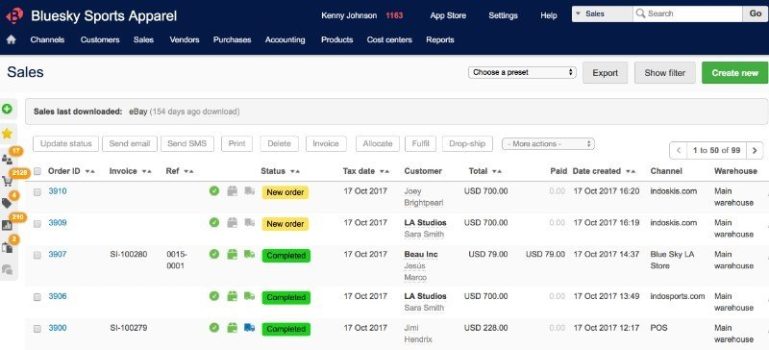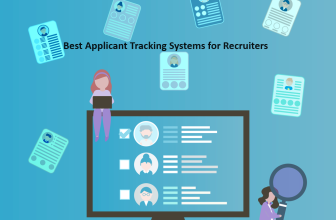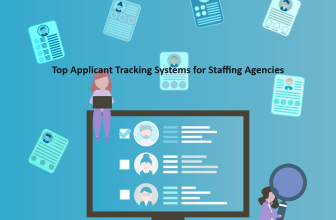Order management software streamline business processes for various industries and enhance the customer relationship as well. But with so many options in the market, it is hard to choose the best order management software. That’s why, we have reviewed the top 10 order management software for all your needs. So, let’s get started!
What we cover
Why use order management software?
Order management software is crucial for businesses and individuals, streamlining the order process from placement to fulfillment. Its significance lies in boosting efficiency, minimizing errors, and offering real-time data insights. Organizations benefit from centralized control, optimizing inventory, and reducing costs, while individuals enjoy improved order accuracy and a seamless shopping experience.
Key advantages encompass faster processing times, improved customer service, and adaptability to market changes. Widely used in e-commerce, retail, manufacturing, and logistics, its effective use demands skills in data analysis and understanding of supply chain dynamics.
General Pricing
Order management software pricing varies based on factors such as features, business scale, and user requirements. For smaller businesses, monthly costs typically range from $100 to $1,000, while medium-sized enterprises may incur expenses between $1,000 and $5,000. Larger enterprises with extensive requirements could surpass the $5,000 threshold.
Several factors influence pricing, including the number of users, order volume, features, industry focus, deployment type, and support services. Market dynamics, occasional promotions, and adjustments in the vendor’s pricing model can also impact flexibility. As you evaluate order management software options, consider your specific needs and budget constraints to make an informed decision aligned with your business goals.
Choosing the right software
Choosing the right order management software is crucial for efficient operations. To make an informed decision and avoid pitfalls, consider these key factors:
- Features and Functionality:
Ensure the software’s features match your business needs, covering order processing, inventory management, tracking, and reporting.
- Integration Capabilities:
Check if the software integrates seamlessly with existing systems like e-commerce platforms and accounting software.
- Cost and Licensing:
Evaluate the total cost, including upfront and ongoing fees, and understand the licensing model. Watch out for hidden costs.
- User-Friendliness and Training:
Choose an intuitive, user-friendly system to minimize training time for your staff.
- Scalability:
Confirm that the software can scale with your business growth, accommodating increased order volumes and expanding product lines.
- Customer Support and Vendor Reputation:
Assess the quality of customer support and research the vendor’s reputation through reviews and testimonials.
Considering these factors ensures a well-informed choice, aligning the software with your operational needs and long-term goals.
Best order management software
In this section, we present a curated list of some of the best order management software options available.
| Features | Zoho Inventory | Net Suite | Linnworks | Odoo |
| Best For | Small to Medium | Medium to Large | Small to Medium | Small to Medium |
| Ease of Use | User-Friendly | Moderate | Moderate | User-Friendly |
| Popularity | Widely Used | Popular | Popular | Growing Popularity |
| Reviews | Positive | Positive | Mixed | Positive |
| Price/Free | Affordable | Expensive | Affordable | Free Option Available |
| Software (IOS or Windows) | Both | Both | Windows | Both |
Best order management software – Let’s dive deeper
1. Zoho Inventory
Zoho Inventory is an online order management software that helps businesses automate their inventory and order processes.
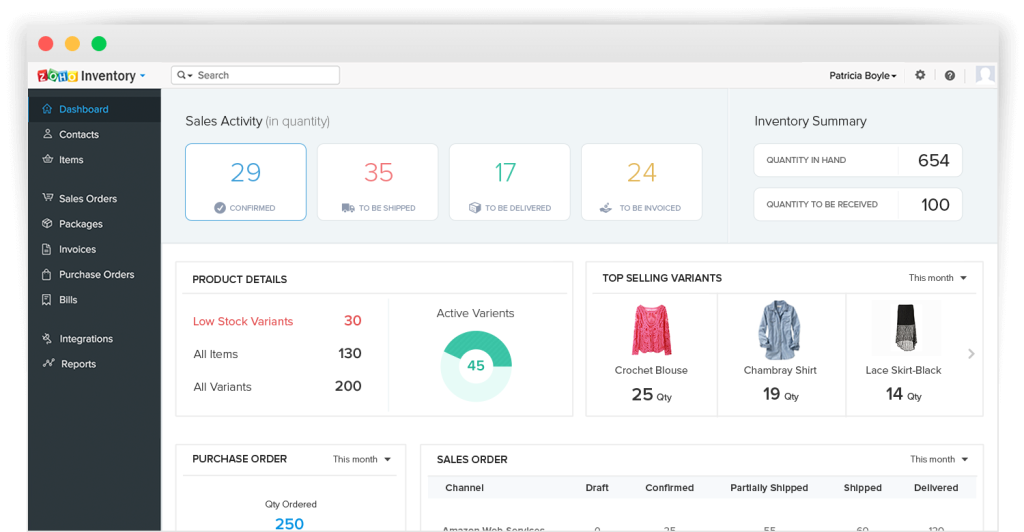
Key Features:
- Multi-channel selling
- Inventory tracking and management
- Order fulfillment automation
Ratings: 4.5
Pros:
- User-friendly interface
- Affordable pricing
- Integrations with popular e-commerce platforms
Cons: Advanced features might require additional customization.
Pricing: Starting at $29 per month.
Zoho Inventory stands out as a cloud-based inventory management solution tailored for small and medium-sized businesses. Its user-friendly interface and affordability make it a go-to choice. The software excels in comprehensive inventory and order management, offering mobile accessibility and robust reporting features.
Zoho Inventory’s strengths lie in its ease of use, affordability, and scalability. With features like comprehensive inventory management, order processing, and mobile accessibility, it caters to businesses of varying sizes. Users appreciate its integration capabilities with popular tools like QuickBooks and Shopify, enhancing its utility and versatility.
Users praise Zoho Inventory for its intuitive interface and seamless integration with e-commerce platforms. The software’s real-time inventory tracking and multi-channel selling support contribute to its positive reception.
Verdict: For businesses with limited budgets, growing inventory volumes, and a need for integration with existing tools, Zoho Inventory proves to be a powerful solution.
Check out Zoho Inventory here!
2. NetSuite
NetSuite is a cloud-based suite of business management applications, including order and inventory management.
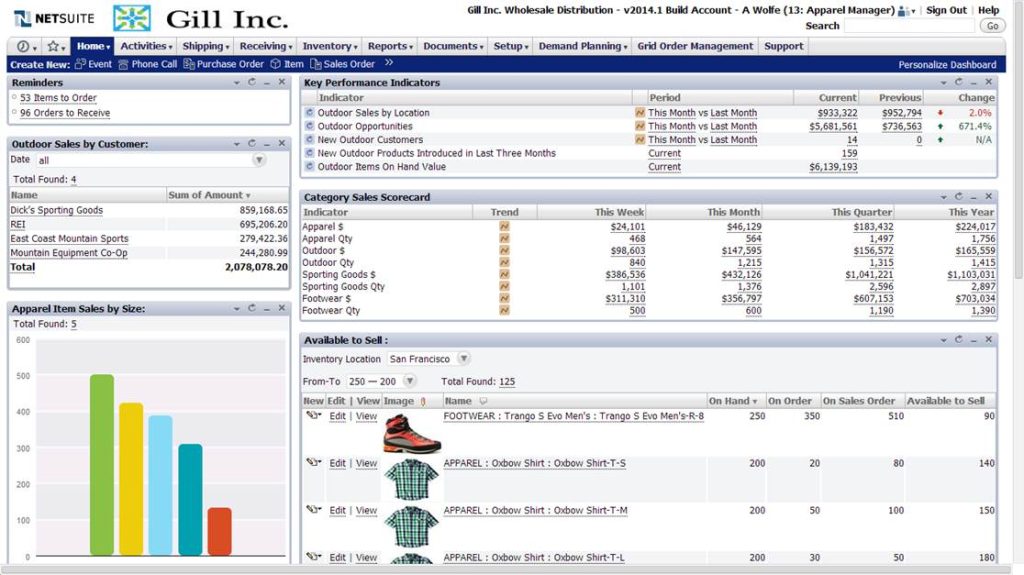
Key Features:
- Unified business management
- Real-time analytics
- Multi-currency and multi-language support
Ratings: 4.1
Pros:
- Comprehensive suite
- real-time analytics
- scalability
Cons:
- Steeper learning curve,
- Higher pricing for smaller businesses.
Pricing:
- Implementation: $10,000 – $100,000+ (One-time)
- Customizations: $150-300/hr (As needed)
- Integrations: $0-$4,000+ (Annual + One-time implementation fee)
NetSuite stands out as a cloud-based ERP software suite, offering a comprehensive set of business management tools for enterprises of all sizes. Known for its scalability and integration capabilities, it covers essential areas such as accounting, CRM, and order management.
NetSuite’s strengths lie in its scalability, reliability, and extensive integration capabilities. Businesses appreciate its comprehensive suite, providing real-time visibility into key metrics. Mobile accessibility and responsive customer support further enhance its appeal.
Users value NetSuite for its comprehensive features and real-time analytics. While the platform may have a learning curve, its scalability and multi-currency support make it a preferred choice, especially for medium to large enterprises with complex operational needs.
Verdict: Despite potential challenges like a higher cost and complexity, its ability to streamline operations, offer real-time insights, and provide reliable support positions it as a valuable asset for growth-oriented enterprises.
3. Linnworks
Linnworks is a cloud-based order and inventory management system designed to streamline e-commerce operations.
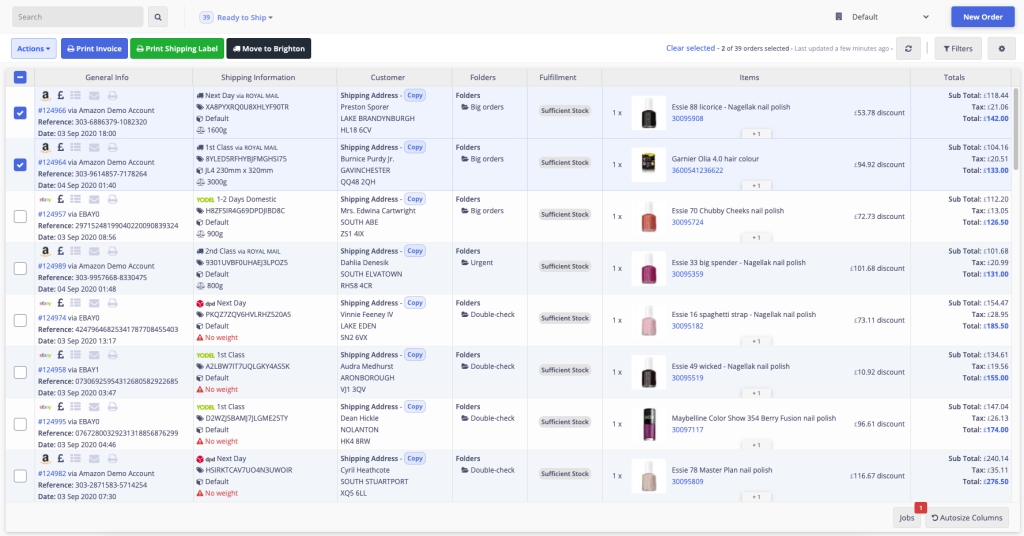
Key Features:
- Multi-channel order processing
- Inventory management
- Shipping and tracking
Ratings: 4.4
Pros:
- Multi-channel support
- User-friendly interface
- Excellent customer support
Cons: Pricing may be a bit high for small businesses
Pricing: Starting at 2,000 orders = $449/month.
Linnworks is a cloud-based multichannel order management system designed for businesses with diverse sales channels. Recognized for its simplicity and scalability, it efficiently manages orders, inventory, and fulfillment across various platforms.
Linnworks excels in multi-channel order management, real-time inventory visibility, and fulfillment automation. Its seamless integration with popular marketplaces enhances its versatility, making it a valuable asset for businesses selling through different channels.
Users appreciate Linnworks for its user-friendly interface and scalability, adapting easily to business growth. The extensive integrations and responsive customer support contribute to its positive reception.
Verdict: With its competitive pricing and emphasis on streamlining order processing and inventory management, it stands out as a valuable option for those navigating the complexities of multiple sales channels.
4. Odoo
Odoo is an open-source business management suite that includes order and inventory management modules.
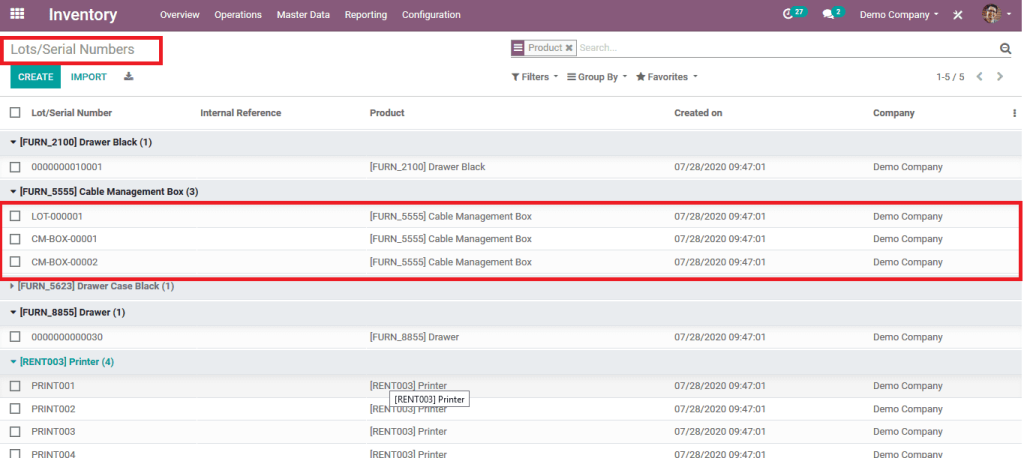
Key Features:
- Integrated suite of business apps
- Customizable modules
- Reporting and analysis tools
Ratings: 4.2
Pros:
- Open-source
- Customizable
- Extensive app ecosystem
Cons: Some users find the learning curve steep
Pricing: $0 – $10.90 / user / month
Odoo, an open-source ERP and CRM solution, caters to businesses of all sizes with its modular architecture. Its versatility spans accounting, inventory, sales, and customer support, offering a scalable and cost-effective option with community-driven development.
Odoo’s flexible and open-source nature appeals to users, providing affordability and scalability. Its user-friendly interface and community support contribute to its positive reception, making it suitable for customization to meet specific business needs.
Users appreciate Odoo’s extensive app ecosystem and reporting tools. While there’s a learning curve, its adaptability and scalability make it a preferred choice for businesses with diverse requirements.
Check out this Odoo eCommerce video!
Verdict: With its comprehensive features and community-driven development, it offers a compelling option for those looking to enhance productivity and customer satisfaction.
5. Quickbooks Online
Quickbooks Online is a cloud-based accounting software that includes order and inventory management features for small businesses.
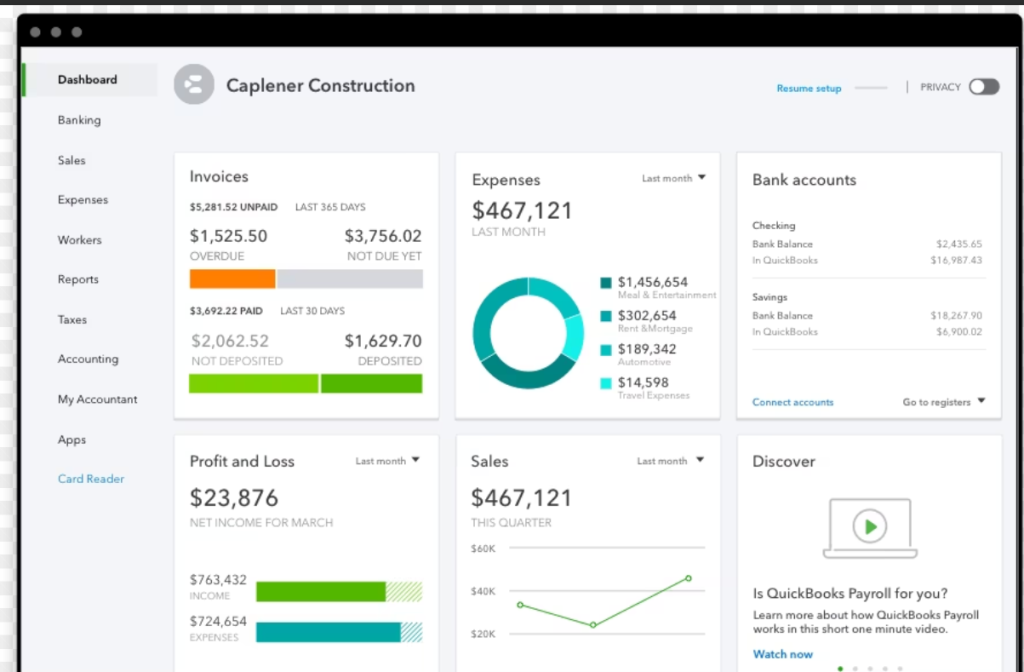
Key Features:
- Invoicing and payment processing
- Expense tracking
- Inventory tracking and reorder points
Ratings: 4.5
Pros:
- User-friendly
- Seamless integration with other Quickbooks features
Cons:
- Limited scalability for larger businesses
- Some users desire more advanced inventory features
Pricing:
- $6/month for Core
- $8/month for Premium
- $10/month for Elite
QuickBooks Online, tailored for SMBs, is a cloud-based accounting solution with a robust feature set, including invoicing, expense tracking, and payroll. Its scalability, affordability, and centralized financial data repository make it a popular choice.
QuickBooks Online excels in ease of use, affordability, and scalability. From invoicing to payroll, it offers a comprehensive financial toolkit. Mobile accessibility and responsive customer support further enhance its appeal.
Users appreciate QuickBooks Online’s user-friendly interface and transparent pricing. While customization options may be limited, it remains highly favored for small and medium-sized businesses with growing financial needs.
Verdict: QuickBooks Online integration capabilities and responsiveness make it a compelling choice for those seeking an effective and efficient financial management tool.
6. Veeqo
Veeqo is a cloud-based inventory and order management system designed for e-commerce businesses to manage their operations efficiently.

Key Features:
- Multi-channel order processing
- Inventory management and forecasting
- Shipping and fulfillment
Ratings: 4.4
Pros:
- Seamless multi-channel support
- User-friendly interface
- Strong customer support
Cons: Free to use
Pricing: Starting at $165 per month.
Veeqo, a cloud-based OMS and inventory management solution, caters to SMBs selling across various channels. Known for its user-friendly interface and affordability, it streamlines order processing and offers real-time inventory visibility.
Veeqo excels in multi-channel order management and fulfillment automation. Its scalability and integrations with popular marketplaces make it versatile, while responsive customer support adds to its appeal.
Veeqo stands out as a powerful and accessible OMS solution, particularly beneficial for SMBs with diverse sales channels. Its efficiency in order processing and automation, coupled with responsive support, makes it a compelling choice for businesses aiming to enhance their operational efficiency.
Verdict: Users appreciate Veeqo’s ease of use and value for money. While customization options may be limited, its competitive pricing and comprehensive features position it favorably for SMBs.
7. Brightpearl
Brightpearl is a retail operations platform that combines order and inventory management with other business functionalities.

Key Features:
- Unified retail operations
- Inventory and order processing
- Multi-channel support
Ratings: 4.4
Pros:
- Comprehensive retail solution
- Multi-channel support
- Automation features
Cons:
- Some users find the interface complex
- Pricing can be high for smaller businesses
Pricing: Custom pricing based on business needs.
Brightpearl, a cloud-based RMS designed for SMBs, excels in multi-channel retail management. Covering inventory, orders, sales, and marketing, it offers a comprehensive solution known for its scalability and integrations with popular e-commerce platforms.
Brightpearl stands out for its user-friendly interface and seamless integration capabilities. Its scalability and responsiveness make it suitable for businesses with complex operations and diverse sales channels.
Brightpearl emerges as a robust RMS solution, ideal for SMBs with intricate retail needs. Despite potential challenges, its competitive pricing, comprehensive features, and responsive support position it favorably for businesses aiming to enhance their retail operations.
Verdict: Users appreciate Brightpearl’s ease of use and value for money. While it provides extensive integrations, some users note potential technical issues and limited customization options.
8. ShipStation
ShipStation is a web-based shipping solution that integrates with various e-commerce platforms to streamline order fulfillment and shipping processes.
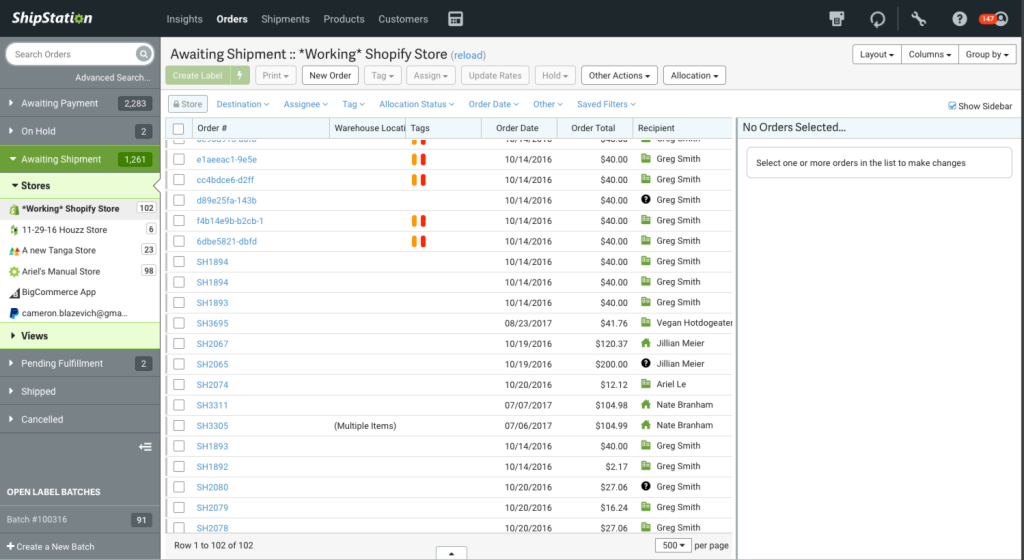
Key Features:
- Multi-carrier shipping
- Order and shipment tracking
- Automation rules for shipping processes
Ratings: 4.6
Pros: User-friendly interface, extensive integrations, excellent customer support.
Cons: Some users find the learning curve steep for advanced features.
Pricing: Starting at $299.99 per month.
ShipStation, a cloud-based shipping solution, stands out for its automation capabilities and cost-effective approach. Its features cover order management, label generation, shipping rate comparison, and real-time tracking, making it a comprehensive tool for businesses seeking shipping efficiency.
ShipStation’s user-friendly interface and affordability make it appealing to businesses of all sizes. Its scalability and integration options contribute to its versatility in accommodating various business needs.
Users appreciate ShipStation’s ease of use, affordability, and responsive customer support. While some note a learning curve for advanced features, the overall positive experience and efficient multi-carrier shipping capabilities outweigh potential challenges.
Verdict: ShipStation emerges as a powerful shipping software solution suitable for businesses aiming to streamline shipping processes, reduce costs, and enhance customer satisfaction.
9. OrderMS
OrderMS is a comprehensive order and inventory management system designed for wholesalers, distributors, and manufacturers.
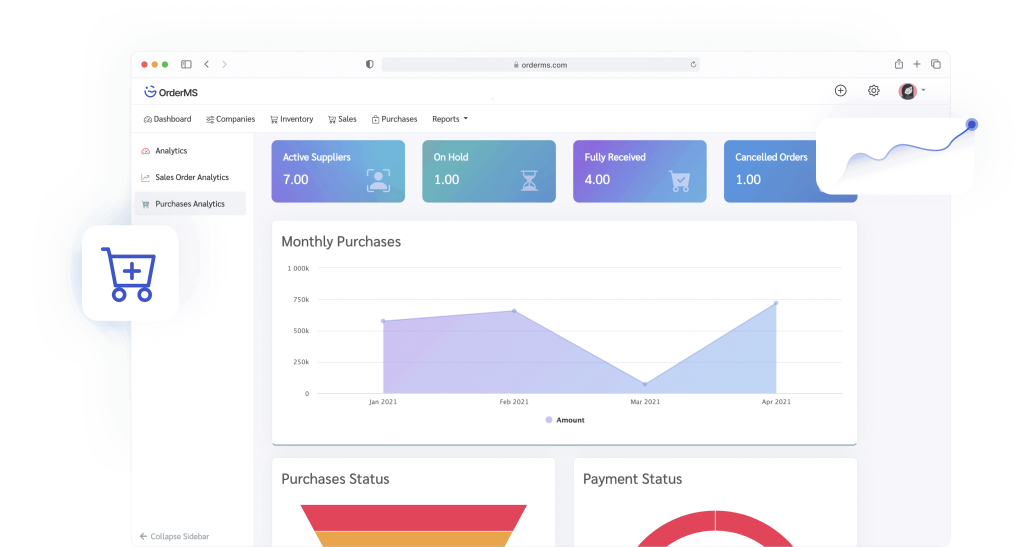
Key Features:
- Purchase order management
- Inventory tracking and forecasting
- Customer relationship management (CRM)
Ratings: NA
Pros:
- Comprehensive features for wholesalers
- Robust inventory tracking
Cons:
- Learning curve for some features
- May have more features than needed for small businesses
Pricing: $0 / month – $149.90 / month
OrderMS, a cloud-based Order Management System (OMS), caters to SMBs selling across diverse channels. With a user-friendly interface and affordability, it excels in multi-channel order management, inventory tracking, and fulfillment automation, making it a valuable asset for businesses seeking operational efficiency.
OrderMS’s scalability and extensive integrations contribute to its versatility, supporting businesses in various sectors. Users appreciate its value for money and responsive customer support, making it a compelling choice for SMBs with complex operations.
Customers praise OrderMS for its user-friendly design, scalability, and comprehensive features tailored for wholesalers, distributors, and manufacturers. While potential technical issues exist, the platform’s robust inventory tracking and forecasting capabilities outweigh concerns.
Verdict: OrderMS is a versatile OMS solution, catering to SMBs with diverse sales channels. Specifically designed for wholesale, distribution, and manufacturing businesses, it offers features like purchase order management and CRM to streamline operations.
10. Skubana
Skubana is an all-in-one cloud-based operations platform that combines order management, inventory management, and analytics.
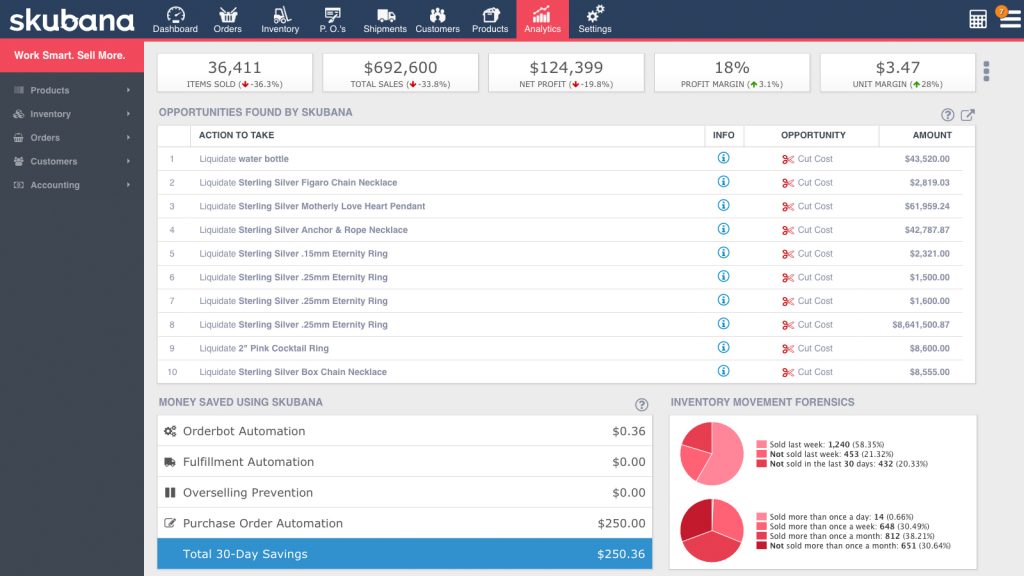
Key Features:
- Multi-channel order processing
- Inventory and warehouse management
- Analytics and reporting tools
Ratings: 4.8
Pros:
- All-in-one solution
- Real-time analytics
- Excellent customer support
Cons: Pricing may be on the higher side for smaller businesses.
Pricing:
- Pricing starts at $1,000 a month
- Custom pricing based on business needs
Skubana, a cloud-based inventory and order management system, targets SMBs selling across diverse channels. Its user-friendly interface and scalability enhance multi-channel inventory management, order processing, and fulfillment automation, while comprehensive reporting adds value.
Skubana’s real-time inventory visibility and order processing streamline operations. Users value its scalability, seamless integrations, and responsive customer support. Despite potential technical issues, Skubana’s competitive pricing and comprehensive features make it a compelling choice for SMBs with complex operations.
Users appreciate its real-time analytics and reporting tools, contributing to informed decision-making. While pricing considerations exist, the overall positive experience and robust customer support solidify its preference.
Verdict: Skubana’s all-encompassing features make it a preferred choice, particularly for businesses with diverse sales channels and a focus on operational optimization.
FAQs
What is order management in supply chain?
Order management in the supply chain is the organized handling of customer orders, covering everything from order entry to product delivery. It ensures smooth coordination between different departments, like sales and inventory, to meet customer expectations regarding accuracy, speed, and reliability.
What are order management process steps?
The order management process begins with customers placing orders, online or in-person. After verifying product availability and pricing, the system checks inventory and triggers restocking if needed. Customers receive order confirmations with delivery details. The items are picked, packed, and shipped. An invoice is generated upon shipping, processing the customer’s payment. Real-time order tracking is available, and the process concludes with the physical delivery of the order.

